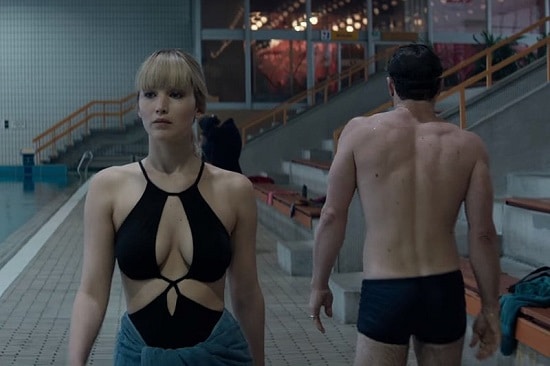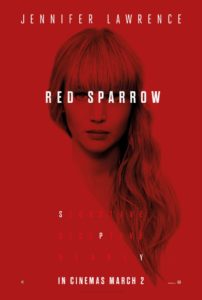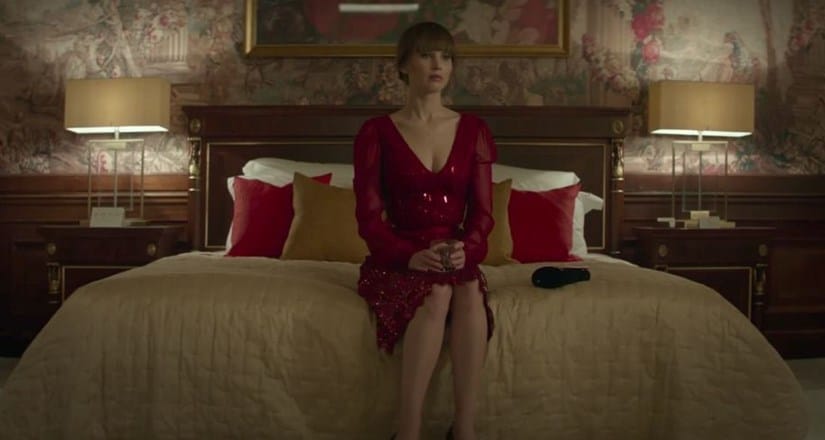
Depending on how closely you follow the news coming out of Hollywood, Red Sparrow is a film which is pretty much impossible to take entirely on face value. Everything from the premise, to the casting of Jennifer Lawrence, to the tag line ‘Take Back Control’ marks the film out as a thriller with a distinctly feminist edge, dealing inherently with men in high places controlling and abusing women, and women fighting back, in part by utilising their own sexuality. The end result is a rather odd cocktail that doesn’t quite sit right. Though the concept and much of the content feels like pure exploitation, both the lead actress and director Francis Lawrence (reuniting after the Hunger Games movies) seem determined to play it all as straight as possible; an approach which at points comes dangerously close to prompting unintentional laughter. The balance feels off as far as the narrative goes, too, as after a fairly intriguing opening half, it trudges off into rather more dull and generic espionage territory in the final act.
Lawrence (actress, not director) is Dominika Egorova, an esteemed prima ballerina with a major Russian ballet company, whose future is thrown into uncertainty following a career-ending leg injury. Given that the company pay her bills and rent, and her mother (Joely Richardson) is seriously ill, Dominka is in dire need of a new and well-paid job as soon as possible. Her uncle, Vanya Egorov (Matthias Schoenaerts) – yes, really, Uncle Vanya – is a high-ranking officer with Russian Intelligence, not to mention something of a lech where his attractive young niece is concerned. Aware of Dominika’s desperation, he talks her into what he promises will be a one-off assignment to get close to – i.e. seduce – a person of interest in order to help extract information. Needless to say, things don’t go as expected, and in a short space of time Dominika sees too much, leaving her with two options: either be executed, or join a programme to be trained as a ‘Sparrow,’ secret agents specialising in manipulating targets via seduction. Naturally, Dominika takes the latter option, and following an intensive training programme, she is soon sent to Budapest to work her Sparrow skills on Nate Nash (Joel Edgerton), a CIA agent believed to be in league with a Russian mole.
 There’s been a lot of talk of Red Sparrow (based on the 2013 novel by Jason Matthews) having a bit of Paul Verhoeven about it, and it’s certainly easy to imagine the Dutch provocateur having a great deal of fun with the subject matter; the only difference being, Verhoeven would doubtless have wholeheartedly embraced the potential for camp, excess and unabashed voyeurism, as opposed to playing things as po-faced as Francis Lawrence does. The film is walking a particular tightrope in the training camp scenes (at one point dubbed ‘whore school’), with a stern Charlotte Rampling instructing her young cadets in sexual techniques and demanding they strip naked in front of the class with joyless military precision. The screening I attended was empty of teenagers, but it seems safe to assume these scenes will prompt widespread sniggering among that portion of the target audience.
There’s been a lot of talk of Red Sparrow (based on the 2013 novel by Jason Matthews) having a bit of Paul Verhoeven about it, and it’s certainly easy to imagine the Dutch provocateur having a great deal of fun with the subject matter; the only difference being, Verhoeven would doubtless have wholeheartedly embraced the potential for camp, excess and unabashed voyeurism, as opposed to playing things as po-faced as Francis Lawrence does. The film is walking a particular tightrope in the training camp scenes (at one point dubbed ‘whore school’), with a stern Charlotte Rampling instructing her young cadets in sexual techniques and demanding they strip naked in front of the class with joyless military precision. The screening I attended was empty of teenagers, but it seems safe to assume these scenes will prompt widespread sniggering among that portion of the target audience.
Indeed, it is in some ways surprising that Red Sparrow has been passed a 15 by the BBFC, given how forthright the sexual elements are, and how harsh the violence gets, with multiple scenes of torture and rape. I suspect this leniency on the part of the classifiers comes down to the ultimate theme of the exploited woman taking back power, and Lawrence herself – both onscreen and off – being held up as a positive role model to young women in this regard. (Of course, the fact that it’s a big budget studio release always goes a long way to greasing the wheels with the BBFC; a cheaper indie release could include much the same content and wind up 18-rated.)
Alas, Red Sparrow falls victim to that old Full Metal Jacket problem: once the early training scenes are over, the rest of it just isn’t that interesting. As Dominika is assigned to get close to Nash, we gradually spiral down into your standard, over-complicated mish-mash of subterfuge, double/triple agents and multitudinous shady deals. Not only is this all a bit tedious and over-familiar, it’s also a little hard to swallow, given how rapidly the former ballet dancer becomes a master spy despite having had no prior experience. Also, anyone anticipating another Atomic Blonde (or, as has been widely remarked, a variation on Marvel’s Black Widow) may be disappointed, as there’s very little action here, and none of it close to that level of Hollywood flash, with hard-edged realism being the order of the day. Still, while Red Sparrow is wilfully determined to subvert expectations given its representation of sex and violence, it seems content to adhere to cliche with its thoroughly unconvincing love story; Lawrence and Edgerton are both fine actors, and of course fine looking people, but there really isn’t much sexual chemistry between the two of them.
In different hands, Red Sparrow might easily have made for your classic old school erotic thriller, and I’m not convinced that sidestepping this route was necessarily the best move. The result is a film that just comes off as dour, likely to alienate the mass audience it covets, and as a result perhaps less likely to really hammer home its message. Sure, there is much to be said in favour of not giving your audience exactly what they want and challenging their preconceptions. In this instance, though, we’re left with a film that falls between two stools, and seems unlikely to prove entirely satisfying to anyone. As good as its intentions may have been, Red Sparrow just never packs enough dramatic punch to really hit home.
Red Sparrow is in cinemas now, from 20th Century Fox.
